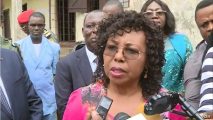Categories
Recent Posts
- Biya regime pledges to repay 616M CFA Francs to Baccalaureate examiners
- France: Marine Le Pen barred from running for public office for five years
- FECAFOOT: Unity prevails amid Eto’o-Brys tensions
- Yaoundé: EYUMEMA welcomes Honorable Rose Abunaw
- CPDM Covid Scandal: Prosecutor seeks 10-Year ban for 4 officials
Archives
- March 2025
- February 2025
- January 2025
- December 2024
- November 2024
- October 2024
- September 2024
- August 2024
- July 2024
- June 2024
- May 2024
- April 2024
- March 2024
- February 2024
- January 2024
- December 2023
- November 2023
- October 2023
- September 2023
- August 2023
- July 2023
- June 2023
- May 2023
- April 2023
- March 2023
- February 2023
- January 2023
- December 2022
- November 2022
- October 2022
- September 2022
- August 2022
- July 2022
- June 2022
- May 2022
- April 2022
- March 2022
- February 2022
- January 2022
- December 2021
- November 2021
- October 2021
- September 2021
- August 2021
- July 2021
- June 2021
- May 2021
- April 2021
- March 2021
- February 2021
- January 2021
- December 2020
- November 2020
- October 2020
- September 2020
- August 2020
- July 2020
- June 2020
- May 2020
- April 2020
- March 2020
- February 2020
- January 2020
- December 2019
- November 2019
- October 2019
- September 2019
- August 2019
- July 2019
- June 2019
- May 2019
- April 2019
- March 2019
- February 2019
- January 2019
- December 2018
- November 2018
- October 2018
- September 2018
- August 2018
- July 2018
- June 2018
- May 2018
- April 2018
- March 2018
- February 2018
- January 2018
- December 2017
- November 2017
- October 2017
- September 2017
- August 2017
- July 2017
- June 2017
- May 2017
- April 2017
- March 2017
- February 2017
- January 2017
- December 2016
- November 2016
- October 2016
- September 2016
- August 2016
- July 2016
- June 2016
Featured
Most Commented Posts
 4 Anglophone detainees killed in Yaounde
4 Anglophone detainees killed in Yaounde
18 comments Chantal Biya says she will return to Cameroon if General Ivo Yenwo, Martin Belinga Eboutou and Ferdinand Ngoh Ngoh are sacked
Chantal Biya says she will return to Cameroon if General Ivo Yenwo, Martin Belinga Eboutou and Ferdinand Ngoh Ngoh are sacked
13 comments The Anglophone Problem – When Facts don’t Lie
The Anglophone Problem – When Facts don’t Lie
12 comments Anglophone Nationalism: Barrister Eyambe says “hidden plans are at work”
Anglophone Nationalism: Barrister Eyambe says “hidden plans are at work”
12 comments Largest wave of arrest by BIR in Bamenda
Largest wave of arrest by BIR in Bamenda
10 comments
Latest Tweets
Featured
-

Biya regime pledges to repay 616M CFA Francs to Baccalaureate examiners
-

France: Marine Le Pen barred from running for public office for five years
-

FECAFOOT: Unity prevails amid Eto’o-Brys tensions
-

Yaoundé: EYUMEMA welcomes Honorable Rose Abunaw
-

CPDM Covid Scandal: Prosecutor seeks 10-Year ban for 4 officials
-

Cameroon still faces power cuts despite full output from Nachtigal Dam
-

Financial scandal rocks Mkpot Oil Mill Project!! Manyu Chiefs won’t talk
© Cameroon Concord News 2025





30, September 2018
The world’s major powers must not ignore Cameroon’s Anglophone crisis 0
Cameroon’s Anglophone region is rapidly becoming a no-go zone. Thousands of residents fled to the country’s French speaking cities of Douala, Yaoundé, and Bafoussam, during August and September, anticipating more blood shed before the country’s October presidential elections.
English-speaking Cameroon makes up roughly 20% of the country’s 24.8 million people. It has been nearly three years since the Anglophone crisis began. It started when English-speaking teachers and lawyers went on strike demanding fair working conditions. They and other Anglophone residents complain that their language and culture are marginalised by Cameroon’s French-speaking government and legislators.
The government responded with force. The conflict that followed has been vicious; unprecedented in the nation’s history. It’s a reminder of older, brutal wars elsewhere in Africa: in Sierra Leone, Liberia and Rwanda.
Lip service is not enough. It’s time for these major powers to act. Great nation status comes with great responsibilities, and particularly in an interconnected global environment there must be a moral imperative in the conduct of foreign policy. These powers must also recognise that Cameroon’s ongoing crisis threatens the wider West African region’s long and short term stability.
Business as usual
There’s no doubt that global powers know exactly what’s happening in Cameroon. In June 2018, the US Subcommittee on Africa, Global Health, Global Human Rights, and International Organisations in Washington D.C heard witness testimonies about the graphic nature of hostilities in Cameroon.
And yet, as a cursory glance at the US embassy website in Yaoundé reveals, it’s mostly business as usual for the two countries. American citizens are warned to avoid travelling to Cameroon’s English speaking regions – but that’s the extent of it.
On its official embassy website, meanwhile, France refers to Cameroon as a “friend” and a “partner”. It calls for “restraint.” Considering how vital the country is to its strategic interests in the West African region, one might expect France to say – or do – more.
China’s actions in this saga have also been extremely frustrating. At the recent Forum of China-African Cooperation in Beijing, President Paul Biya was given the red carpet treatment. No Chinese leaders, and none from the rest of Africa, made any public statements about the Anglophone crisis.
Strategic importance
All of this is extremely vexing given Cameroon’s strategic importance. For many years the US monitored its interest in Equatorial Guinea from Yaoundé. Cameroon and the US are partners in coordinating efforts against Boko Haram and other global terrorist groups.
Cameroon is vital to France’s interest in the West African region. The Anglophone crisis could destabilise the region by snowballing into neighbouring countries. And other former French colonies will be watching with interest, noting the European power’s hands off approach.
China’s policy of non-intervention in another country’s domestic affairs has only strengthened the resolve of tyrants like Biya. He remains one of China’s key allies in the region. Publicly, China’s Premier Li Keqiang has said little about the ongoing Anglophone Crisis. Instead he’s given more money to Biya’s government and enjoys cordial relations with the long time leader.
Perhaps as long as the crisis doesn’t interfere with China’s receipt of timber, rubber and other raw materials from Cameroon, there won’t be a shift in Beijing’s attitude any time soon.
Agitating for change
It seems unlikely, though, that the world’s major powers will totally change their approach to what are viewed as sovereign issues.
But there are things that can be done, and some are quite basic. Biya can be forced to do the right thing. For instance, he spends a significant amount of vacation time in Switzerland.
There is absolutely no reason why European nations and journalists shouldn’t speak out about the leader’s spending of his country’s resources in Switzerland, France, and other places.
Emmanuel Macron, France’s president, must turn his verbal threats into actions. Sanctions, for instance, will force Cameroon to address the Anglophone problem. France could also stop the supply of military hardware and intelligence to Biya’s regime.
China can also do more. Its policy of non-intervention doesn’t apply when its interests are threatened: it intervened in Zambia’s elections to safeguard its interests there.
Finally, the African Union has a role to play while it awaits more concerted efforts from European powers. For instance, the continental body could threaten to withdraw the hosting of next year’s African Nations Cup if Biya doesn’t offer a clear timeline for solving the Anglophone crisis. This threat to a major money spinner and point of prestige could shock Biya into action.
Source: News 24